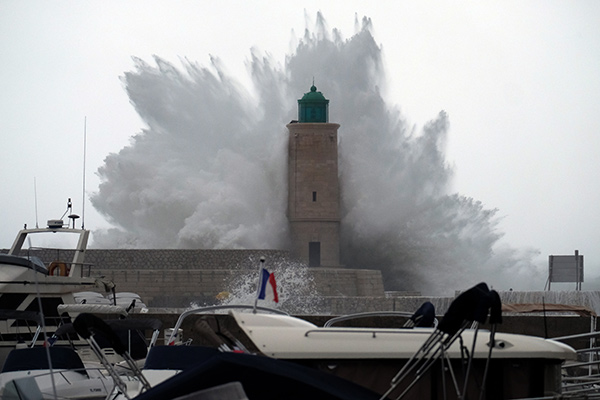
BRUSSELS – High winds and heavy snow in Europe on Monday stranded thousands of travelers, kept schoolchildren at home and even played havoc with international diplomacy.
It was the second day running of fierce weather across the continent, with the United Kingdom still digging out from its deepest snowfall in four years.
The snowed-over runways in Brussels led to about 300 flight cancellations on Monday – with Brussels airport saying the number amounted to half of those scheduled – and some 100 delays, including for the plane carrying Israel’s Prime Minister Benjamin Netanyahu back home.
He tweeted a video from his plane that opened with a shot of the white tarmac at the close of his European visit, which was marked by the US recognizing Jerusalem as Israel’s capital.
A scheduled meeting between Netanyahu and European Commission President Jean-Claude Juncker had to be called off because of the weather, officials said.
Brussels airport officials advised passengers to stay away, as staff were trying to de-ice planes and clear snow from the runways.
Schiphol airport, just outside Amsterdam, had canceled more than 400 flights by early afternoon, while many others faced long delays.
Snowfall in the Netherlands led to a record traffic jam of over 1,500 kilometers in the Netherlands and problems in public transport on Monday.
But it was not just knee-high snow that was causing trouble, with winds of up to 150 km/h forecast along France’s Atlantic Coast.
About 50,000 homes were still without power in France on Monday evening as storms continued to sweep the center and west of the country. At the height of the storm, some 120,000 households were without electricity.
Brutal winds shut down ferry services between the southern Spanish port of Algeciras and Tangiers in Morocco, while also shuttering some schools in southern Spain.
At the same time, Britain was recovering after heavy snow brought freezing temperatures, prompting the closure of hundreds of schools and disrupting flights for a second day.
Power was restored to more than 100,000 homes, while airports tried to recover their schedules following this winter’s first major snowfall – the biggest in four years.
The last time Britain saw this much heavy snow nationwide was in March 2013.
Newspapers were filled with pictures of people either enjoying the snow or stuck in gridlock on the roads.
About 32 centimeters of snow fell in Sennybridge in south Wales on Sunday.
And temperatures overnight dropped to -11.6 C in Northumberland, England.
Schools closed
The Western Power Distribution network said it had restored power to more than 99,500 customers, while a further 7,000 were still without electricity, largely in west-central England.
But disruptions continued on the roads and at airports.
London Heathrow, Europe’s busiest airport by passenger numbers, said it was still experiencing problems.
“Some flights at Heathrow will be disrupted on Monday due to crew and aircraft being out of position following yesterday’s weather,” it said.
“We’re working with our airline partners to return aircraft to where they need to be, and full service recovery remains the focus.”
Hundreds of schools were closed in western England and north Wales, while much of the country was on a yellow weather warning for snow and ice.
All local authority-run schools in the central city of Birmingham were also shut.
Elsewhere in Europe, a woman in her forties was killed after a tree fell on her car during high winds, and three others were injured.
In Germany, more than 300 flights were canceled in Frankfurt due to the high levels of snow.


